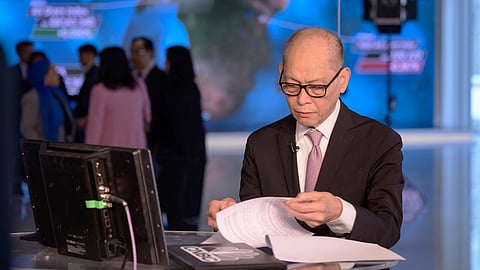
- NEWS
- the EDIT
- COMMENTARY
- BUSINESS
- LIFE
- SHOW
- ACTION
- GLOBAL GOALS
- SNAPS
- DYARYO TIRADA
- MORE

The Executive Department is currently discussing the proposal to reduce import tariffs on rice as part of a comprehensive strategy to decrease prices and mitigate a potential shortage of the staple, Finance Secretary Benjamin Diokno said on Monday.
This is after several farmers from different provinces protested in front of the Department of Finance (DOF) to denounce Diokno's proposal to cut import tariffs on rice and demand the removal of the Finance secretary from his post.
In a Viber message to reporters, Diokno said the review is part of a comprehensive strategy to reduce prices for consumers and mitigate a potential shortage of the staple due to the impact of the ongoing El Niño phenomenon.
"As discussions are underway, the DOF maintains its support for an appropriate policy response that promotes the greatest good for the greatest number of Filipinos," Diokno said.
"Rest assured that the DOF, in coordination with other relevant government agencies and stakeholders, shall pursue programs and support measures to balance the interests of domestic rice farmers while keeping rice affordable for consumers — especially the poorest households," he added.
In a separate statement, the National Food Authority (NFA) Council, chaired by President Ferdinand Marcos Jr., set a new price range for palay buying price on Monday in response to the changing production and market conditions to improve farmers' income and ensure sufficient supply of the staple.
"I called for a meeting of the NFA Council to discuss how we can adjust the purchasing price of NFA for rice, both wet and dry because we need to reevaluate the situation," Marcos said following a meeting by the NFA Council.
"That's exactly what we discussed, and we decided that the buying price of NFA from now on will be 19 to 23 for dry and 16 to 19 for wet. That was the decision of the NFA Council," he added.
The council came up with the new palay buying price range to provide Filipino farmers with a better income, the President said, considering today's reasonable palay production cost.
"So, they will now have a profitable venture. And aside from that, we have the price cap in place to stabilize the rice prices," Marcos said.
The originally proposed P20 and P25 per kilo buying prices are just too high and will spike retail prices, according to the NFA, noting that the new decided price range balances the profit of farmers and will not affect the retail prices as much.
The agency said that if the new buying price of dry palay is at P23, the procurement fund needed will be P15 billion at the maximum; while if it is pegged at P25, P16 billion will be needed for palay procurement.
For its part, the Department of Agriculture (DA) said it would support the NFA proposal but at a level of P23 a kilo. The agency added that at P22 or P23, farmers are satisfied with it since they are now being paid P16 to P19. DA noted that P25 is just too high.
Asked by the President on the influence of NFA's buying price as well as the public reaction, National Economic and Development Authority (NEDA) chief Secretary Arsenio Balisacan said that at the farm gate level, NFA procurement will be concentrated in areas where there is excess supply relative to local demand.
"In that case, it can help elevate farm gate price," Balisacan said.
